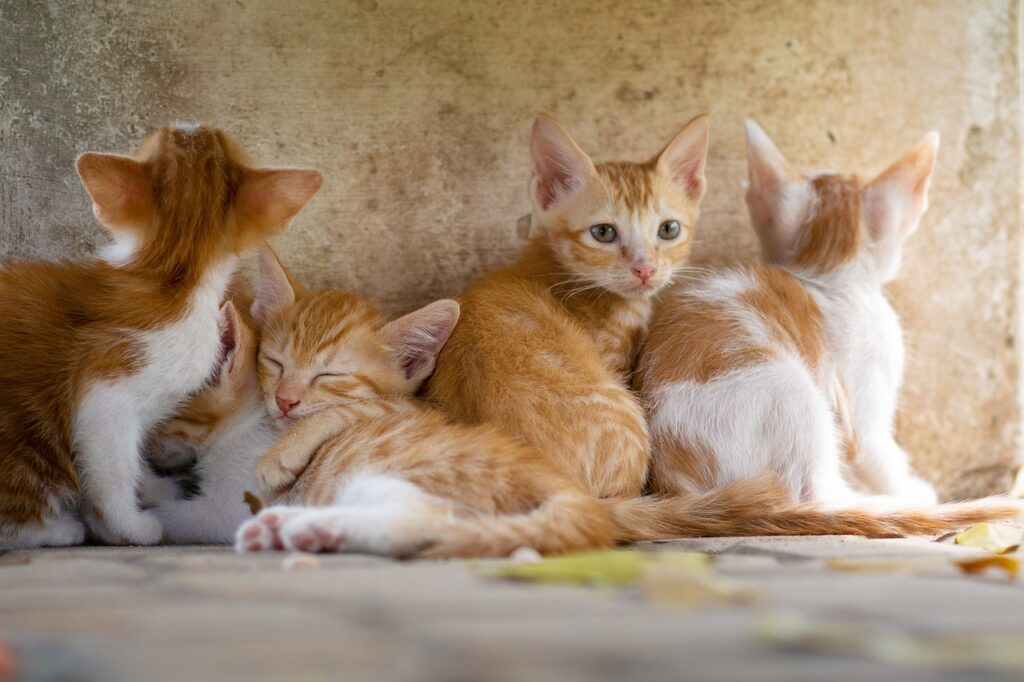Can Cats Eat Kiwi? – Yes, They Can
Cats can indeed eat kiwi but it’s best to serve it in moderation. This vibrant fruit is packed with nutrients that may benefit your feline friend, such as vitamins C and K, potassium, and dietary fiber. However, since a cat’s primary diet should consist of meat, kiwi should only be an occasional treat. The exotic taste might be a delightful surprise for your kitty, but keep an eye on how they react to this new food.
Can Kittens Eat Kiwi?
Yes, kittens can eat kiwi, but even more caution is needed. Their digestive systems are not fully developed, and they primarily need proteins to grow. If you decide to introduce kiwi, it should be in tiny amounts to avoid upsetting their stomachs, and you should always consult your vet first. Older kittens can handle more diverse foods than the very young, but caution is key.
Things to consider when feeding kiwi to kittens?
When feeding kiwi to kittens, always consider the size and the quantity. The kiwi skin should be removed to prevent choking, and the fruit should be cut into small, manageable pieces. Initially, offer the kitten a tiny piece to see if they like it and to watch for any adverse reactions. Digestive upset in kittens can be serious, so it’s crucial to be vigilant and to introduce any new food slowly and in moderation.
Nutritional Benefits of Kiwi for Cats – Why Kiwi is Good for Cats?
Vitamin C
Kiwi is an excellent source of Vitamin C, which is an antioxidant that can help boost a cat’s immune system. While cats produce Vitamin C naturally, the extra boost can help support their health, especially for those with weakened immune systems.
Vitamin K
This fruit contains Vitamin K, which plays a crucial role in blood clotting and bone health. Although deficiencies are rare in cats, a little boost through a tasty treat might be beneficial.
Potassium
Kiwis are rich in potassium, essential for proper heart and kidney function. However, given a cat’s small size, they’d only require a tiny bit of kiwi to reap these benefits.
Dietary Fiber
The dietary fiber in kiwi can aid in a cat’s digestive process. But since cats are carnivores, too much fiber can be counterproductive, so remember – moderation is vital.
Antioxidants
Kiwi also contains various antioxidants. They can help counteract free radicals in your cat’s body, potentially lowering the risk of chronic diseases and supporting overall health.
Potential Allergies: Can Cats Be Allergic to Kiwi?
Though not common, cats can be allergic to kiwi. As with any new food, it’s important to introduce kiwi slowly and in small quantities—starting with just a bite—to monitor for any adverse reactions.
Symptoms of Kiwi Allergies in Cats
- Vomiting or Diarrhea: If your cat experiences digestive upset shortly after eating kiwi, this could be a sign of an allergy or intolerance.
- Itching or Skin Irritation: Allergic cats may excessively groom or scratch due to itchy skin because of a kiwi allergy.
- Respiratory Issues: Monitor for coughing, wheezing, or other breathing difficulties, as these can be symptoms of a more severe allergic reaction.
What to Do If Your Cat Shows Symptoms?
- Discontinue feeding kiwi: If you notice any signs of an allergic reaction, stop offering the fruit and monitor your cat closely.
- Consult your veterinarian: For severe reactions or if symptoms persist, seek professional medical advice to ensure appropriate care for your pet.
- Observation: Keep a close eye on your cat’s behavior and bodily functions for continued or additional symptoms.
Recommended Amount: How Much Kiwi Can a Cat Consume?
The recommended quantity of kiwi for a cat should be no more than a couple of small pieces. As a general rule, fruit snacks, including kiwi, should not make up more than 10% of a cat’s daily caloric intake. Always remove the skin and seeds to prevent any risk of choking or digestive discomfort.
Things to Consider When Feeding Kiwi to Cats
Always ensure the kiwi is ripe and soft, but not overly so, to avoid any choking hazard. Also, kiwi should be free of pesticides or other chemicals, so wash the fruit thoroughly or opt for organic options. Lastly, consider your cat’s individual health, preferences, and any existing dietary restrictions when introducing any new treat.
How to Feed Kiwi to Cats: A Quick Guide
Kiwi can be a fun and enriching snack for your cat when given properly. Bursting with flavor and nutrients, it may even become your kitty’s favorite treat — if they take to the taste.
Simple Peeled Kiwi Bites
Peel a ripe kiwi, cut it into quarter-inch thick pieces, and offer one or two to your cat as a treat. Observe how your cat enjoys the new snack and adjust the portion accordingly in future feedings.
Frozen Kiwi Slices
Slice peeled kiwi and place the slices in the freezer for a cool treat, especially refreshing on a hot day. Ensure the frozen slice is small enough for your cat to comfortably eat.
Mixed Fruit Salad (Cats and Owners)
Prepare a fruit salad with kiwi, melon, and blueberries for yourself and set aside a few small bites of kiwi for your cat. Ensure all fruit portions for your cat are small, free of seeds, and served in moderation.
Conclusion
While kiwi is safe for cats in small quantities, it’s essential to introduce this exotic fruit slowly and watch for any negative reactions. Kiwi shouldn’t replace a cat’s balanced diet but can be a delightful occasional treat. Remember to consult your vet with any concerns, especially when it comes to kittens or cats with health issues. Enjoy sharing this sweet treat with your feline friend!



